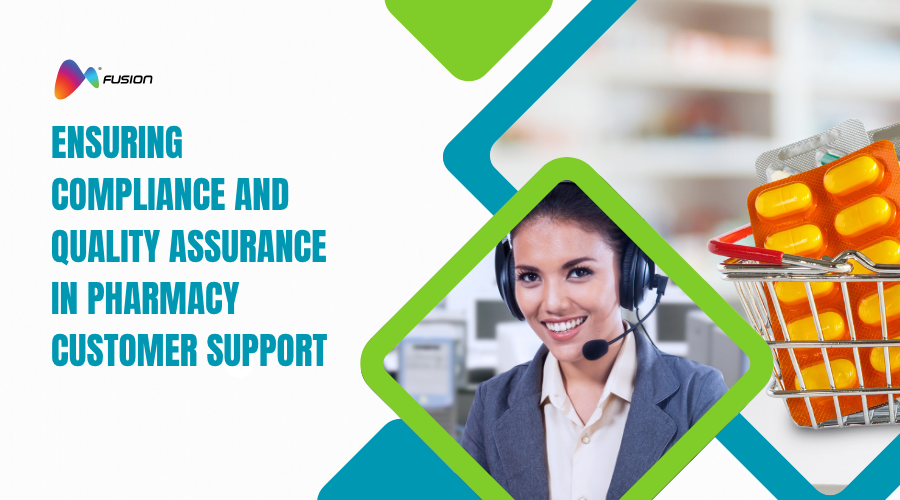In pharmacy operations, customer support isn’t just a service touchpoint—it’s a regulated extension of care. Every interaction, from refilling prescriptions to answering insurance queries, carries not only brand implications but also regulatory risks. For pharmacy contact centers, the stakes are high: mishandled data, incorrect information, or non-compliant conversations can trigger fines, patient dissatisfaction, or worse—compromised safety.
In this blog, we explore why compliance and quality assurance are non-negotiables in pharmacy customer support, how they impact patient trust and operational integrity, and how leading pharmacy call centers are building a culture of excellence, not just efficiency.
Why Compliance in Pharmacy Customer Support Matters
Pharmacy customer service teams regularly handle:
- Protected Health Information (PHI)
- Insurance details and copays
- Medication guidance and therapy follow-ups
- State- and federal-specific pharmacy regulations
This makes pharmacy contact centers a high-risk environment for non-compliance if the right controls aren’t in place. Regulatory bodies like the U.S. Department of Health & Human Services (HHS) and Centers for Medicare & Medicaid Services (CMS) hold pharmacies to strict standards, especially when it comes to HIPAA, Medicare Part D communications, and marketing practices.
Failure to comply can result in:
- Legal penalties and audits
- Revoked licenses or payer contracts
- Data breaches and class-action lawsuits
- Loss of customer trust and brand damage
The margin for error? Almost nonexistent.
Key Compliance Areas for Pharmacy Call Centers
1. HIPAA and PHI Handling
Every pharmacy call center must ensure that agents:
- Verify patient identity before disclosing information
- Use secure communication channels
- Log access and actions in audit-ready formats
- Understand what constitutes PHI and how it must be protected
Even a well-intended agent sharing details with a family member without proper authorization could lead to a reportable violation.
2. State-Specific Pharmacy Laws
Each U.S. state has its own regulations around:
- Who can counsel patients
- What information can be shared by non-pharmacists
- Telepharmacy and remote support guidelines
Pharmacy contact centers serving nationwide customers must train agents on region-specific rules, with routing logic to ensure proper escalation to licensed pharmacists when needed.
3. Medicare Marketing and Outreach Rules
Pharmacy call centers supporting Medicare Part D plans or PBMs must navigate additional scrutiny:
- Agents can’t use misleading language or pressure tactics
- CMS prohibits cold calling for some products without prior consent
- Any outbound campaign must adhere to script and timing regulations
These aren’t just best practices—they’re requirements with financial consequences.
4. Drug Information and Patient Guidance
Agents discussing medication refills, side effects, or dosage schedules must be trained to not overstep into clinical advice unless they’re licensed to do so.
- Having a clear escalation path to pharmacists or clinical teams
- Using approved messaging frameworks for non-clinical staff
- Documenting all interactions for compliance audits
Quality Assurance: The Unsung Compliance Partner
While compliance focuses on adherence to laws, quality assurance (QA) ensures that those standards are consistently met—and elevated.
What QA in Pharmacy Customer Support Looks Like:
- Call Monitoring and Scoring
- Calibration Sessions
- Error Trend Analysis
- Training Reinforcement
In regulated environments like pharmacy support, QA becomes your early-warning system—identifying risks before they become reportable events.
Technology’s Role in Compliance and QA
1. AI-Powered Monitoring
Natural language processing (NLP) can flag:
- HIPAA-related language
- Policy deviations
- Escalation triggers not followed
- Tone mismatches or potential dissatisfaction
2. Real-Time Agent Assist
Real-time agent assist tools can:
- Prompt the correct identity verification questions
- Prevent disclosures without consent
- Auto-fill disclaimers and required disclosures
- Remind agents of state-specific protocols
3. Centralized Documentation and Reporting
Your call center platform should be able to:
- Generate interaction history for any patient within seconds
- Provide proof of compliance actions taken
- Show error resolution workflows
- Deliver real-time dashboards to CX and compliance leadership
Fusion CX: Built for Pharmacy Compliance, Focused on Quality
At Fusion CX, we recognize that pharmacy customer support is part of the healthcare continuum—and must be treated with the same seriousness as clinical operations.
Here’s how we support high-compliance pharmacy programs:
- HIPAA-Certified Infrastructure
- Specialized Agent Training
- AI-Enhanced QA Framework (MindVoice and MindSpeech)
- Segregated Network Environments
- High Availability + Redundancy
We’ve built pharmacy call center operations not just to meet standards—but to set benchmarks.
Final Dose
In the pharmacy world, compliance isn’t a checklist. It’s a culture. And quality isn’t a department. It’s a discipline.
By embedding compliance and QA into every layer of your pharmacy customer support—people, process, and platform—you create a foundation of trust, safety, and operational excellence.
Because when your patients are trusting you with their health, compliance isn’t just about avoiding fines. It’s about doing what’s right.

